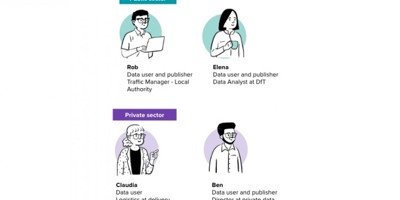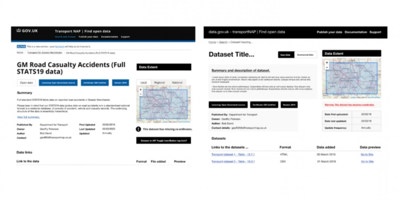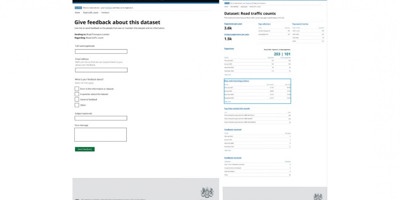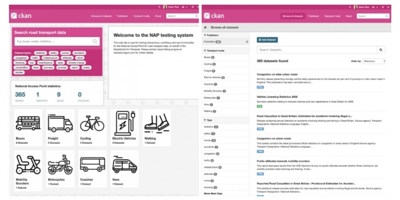The Department for Transport (DfT) has the ambition to bring data providers together, making data more accessible to solve road-based challenges through a National Access Point (NAP).
We’ve been supporting DfT to recognise what could be improved and introduced to provide the right digital infrastructure and enable easier access to the UK’s road transport data.
Meeting different needs
Those in the transport community that would most immediately benefit from a new NAP work in central government, local authorities, the commercial sector and research. All of which have a broad set of needs and different levels of data literacy. It was clear that creating a data catalogue that effectively met the needs of all of these different types of users was going to be a challenge.
How people would use data
To help us understand each of these users, their challenges and how they would use and publish transport data, we looked at what each of them needed most from a NAP.
We spoke with a range of participants to grow our understanding of data publisher journeys and how we might improve data discoverability and metadata. Learning from users from over twenty organisations, we developed four personas to represent the full spectrum of those we spoke to. These included varying levels of technical expertise with different goals, data tasks, motivations and challenges.

This helped us focus on four areas that the current NAP is lacking, which include the visualisation of data, use case examples and user friendly feedback and engagement. Whilst looking at improving the search feature and the inclusion of commercial data to provide a complete view of data sources.
Developing the prototypes
During the Alpha phase, we developed multiple prototypes including a dataset page mock up, feedback and analytics pages mock up and a customised CKAN search engine.
Dataset page mock-up
This focused on confirming which metadata is more useful than others while allowing users to look for information on data standards, explanations of technical terms and guidance on metadata.

Feedback and analytics pages mock-up
We also created a feedback and analytics pages mock up, which includes an optional registration function with added benefits to facilitate feedback submission.
Through our conversations, we found that feedback is rarely provided directly, but openly shared and discussed on public forums like Twitter. Data users suggested including an optional registration function to facilitate feedback submission, as well as a more personalised experience with the NAP. This new feature creates a more personalised experience for the user, with elements such as browser history and push notifications.

"It’s very useful for us to get feedback on how our data has been used and the amount of engagement people have had with it. It helps justify the resource needed."A public data publisher
Customised search engine
Our final prototype was a customised CKAN site, which incorporates groupings of datasets by mode of transport or publisher. It included different filters including dataset format, by dates, tags and licensing or access rights. Going forward we’ve made recommendations to continue to improve data discoverability by focusing on search engine optimisation and automating the inclusion of new data sources to the NAP where possible.

Passing the Alpha service assessment
The NAP recently passed an Alpha service assessment which means our prototypes meet crucial standards that cover being simple to use, meeting user needs, solving a whole problem and using open-source technology.
As the Service Standard is a blanket approach to evaluating all public services, some of its points were more applicable to NAP than others. Where points were less relevant, we gathered evidence for possible equivalents. For example, the NAP metadata catalogue is a fully-digital service, because it focuses on data discoverability across multiple different digital sources. We established that people without access to the internet wouldn’t be able to access the data the NAP signposts to on other websites and digital services. To meet the service requirement to “make sure everyone can use the service”, it was more relevant to talk about data users with low data comprehension and how the NAP could support them more effectively.
We also considered users with accessibility requirements. While providing visualisations of data meets a crucial user need, there’s also a risk that we won’t be able to make that feature fully accessible. We’ve recommended rigorous accessibility testing during Beta, hopefully ensuring suggested features like data visualisation have the same or similar fidelity for users who use screen readers or other assistive technologies.
Looking forward, we hope that Beta will test scalability, as Alpha only focused on a portion of UK road data. Post-launch, the live service is expected to grow to cover all transport data with the added possibilities for data publishers and users to adapt the NAP model, contributing to more efficient use of data by even more users in different industries.

Transforming Government
We partner with the institutions of Government to help them work better. Our approach delivers digital transformation in government that is user-centred, data-led and cost-effective.
Work with us
Designing for users who don’t exist (yet)
How we approached building a new service alongside emerging policy at DESNZ, and working with proto-personas as living hypotheses.
Read moreOur recent insights
Transformation is for everyone. We love sharing our thoughts, approaches, learning and research all gained from the work we do.

Building better public services with service patterns
We explore how service patterns can create more consistent, efficient, and user centred services.
Read more
Where ideas, innovation, and community collide
UK Gov Camp 2025 was an inspiring unconference buzzing with ideas, connections, and collaboration to create positive change in the public sector.
Read more
A user centred approach to effective governance
User centred design (UCD) can simplify complex governance in the public sector, making processes more efficient and empowering for all involved.
Read more

